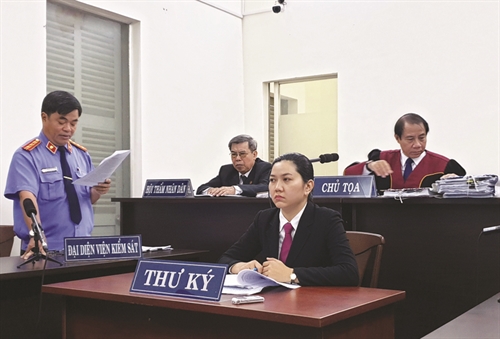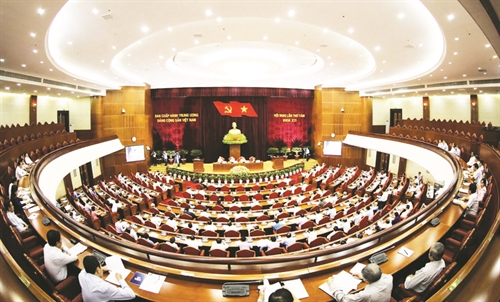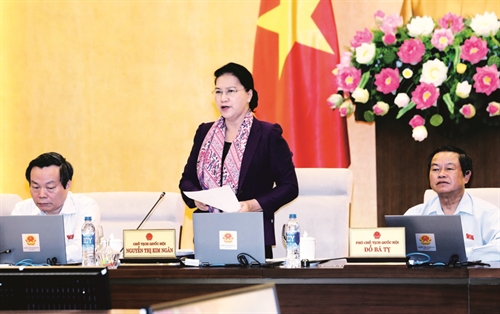Invalid contracts in general and void contracts in particular are provided in the 2015 Civil Code (the 2015 Code) on the basis of adhering to the principles of recognition, respect, protection and guarantee of civil rights; the fundamental principles of the civil law; and the principles on performance of civil rights and limitations on performance of civil rights. This article deals with some issues on void contracts under the current private law of Vietnam.
Nguyen Hong Hai
Deputy Director-General
Department of Civil-Economic Laws, Ministry of Justice
Civil code as general law governing private relations
The 2015 Code’s provisions on invalid contracts in general and void contracts in particular aim to ensure that the Civil Code is a code of respect for and protection of civil rights and a law of market relations and conforms to international practices. The Code also aims to guarantee the two most fundamental values of a market-economy society, equality, freedom and voluntariness of all subjects in private relations: equality between the State or its agencies and other subjects in private relations and minimization of the State’s intervention into these relations.[1] The Code’s general provisions on effect of civil transactions and on invalid civil transactions in Articles 116 thru 133 also serve as basic legal grounds for regulating contracts and invalid contracts.
In response to the diversity of private relations as well as socio-economic development and international integration needs, the provisions on contracts (including provisions on invalidation of contracts) in Vietnam’s private law have been more systematized. Aside from the Civil Code as a general and fundamental law regulating contracts, numerous legal documents contain specific provisions on contracts in general and void contracts in particular to deal with specific issues of private relations in such areas as land, housing, commerce, construction, planning, forestry, fisheries, minerals, electricity, securities, bidding, etc. Therefore, to ensure synchrony, consistency, inclusiveness and flexibility in law making and application, Vietnamese lawmakers have added the principles of application of private law in Article 4 of the 2015 Code[2], specifically as follows:
(i) The Civil Code is the general law regulating private relations;
(ii) Other relevant laws[3] that regulate private relations in specific fields must not contravene the fundamental principles of the civil law prescribed in Article 3 of the Civil Code;
(iii) In case another relevant law has no provisions or has provisions contrary to the fundamental principles of the civil law, the Civil Code shall apply;
(iv) Should there be any difference in the provisions on the same issue between the Civil Code and a treaty to which Vietnam is a contracting party, those of such treaty shall prevail.
So, it is easy to notice that Vietnamese lawmakers have given priority to the application of other relevant laws in dealing with contracts in general and void contracts in particular. That means, for contracts already regulated by a law, either the Civil Code or such law may apply.[4] For contracts not yet governed by any specific law, the Civil Code’s general provisions shall apply.[5] However, from the perspective of relative application of law, it can be seen that all types of contracts may be regulated by the civil law. Other relevant laws often concretize conditions for specific contracts to become effective[6], while the identification and handling of invalid contracts still comply with the Civil Code.[7]
 |
| Lao Minister of Planning and Investment Suphan Keomisay and Director General of Vietnam’s Viet Phuong Group Phuong Minh Hue exchange a contract on bauxite exploitation and processing in Laos__Photo: Pham Kien/VNA |
Definition of invalid contract
The Civil Code and other relevant laws of Vietnam give no specific explanations about “invalid contract”. However, a definition of invalid contract may be drawn out from Article 122 of the 2015 Code (which reads a civil transaction that fails to satisfy one of the conditions specified in Article 117 of this Code shall be invalidated, unless otherwise prescribed by this Code), and from the provisions on recognition, respect, protection and guarantee of civil rights, fundamental principles of the civil law, principles on limitations on performance of civil rights, and self-protection of civil rights (Articles 2, 3, 9, 10 and 12), specifically as follows:
First, a contract will be considered invalid if its establishment does not satisfy the law-prescribed conditions.[8] Objectively, this reflects the State’s legal attitude to deny the effect of a contract that is established without satisfying one of the law-prescribed conditions. i.e., lawmakers see this contract as never existing (in the past, presence and future). Subjectively, an invalid contract will not give rise to legal consequences concerning the establishment, performance, or termination of civil rights and obligations as expected by the contracting parties.
Second, with the provisions on invalid transactions in Article 122 of the 2015 Code, Vietnamese lawmakers have officially recognized that a contract which does not satisfy the law-prescribed conditions to become effective may or may not be declared invalid.[9] That also means the Code recognizes the existence of void contracts and voidable contracts, although such recognition should rely on legal signs described in specific provisions on handling of invalid contracts or on civil legal theories.[10]
Third, Vietnamese lawmakers have come up with a clearer principle for identifying whether a contract is declared invalid in part or in whole through the provisions on limitations on performance of civil rights in Article 10.2 of the 2015 Code, which says in case an individual or a legal person fails to comply with the provisions on limitations on performance of civil rights, the court or another competent agency, based on the nature and consequences of the violation, has the right not to protect part or the whole of his/her/its rights, order compensation for damage, if any, or apply other sanctions prescribed by law.[11]
Fourth, compared to the 2005 Civil Code (the 2005 Code), the 2015 Code has distinguished “contract invalidation” from “contract cancellation” in Article 131.1, which reads: “An invalid civil transaction will not give rise to, change or terminate any civil rights or obligations of the parties from the time of establishment of such transaction,” and in Article 427.1 stating: “When a contract is cancelled, it will cease to be effective from the time of its entry and the parties do not have to perform the obligations already agreed upon, except the agreements on penalties for breach of contract, compensation and dispute settlement.”[12]
Practical application of provisions on void contracts
The 2015 Code gives provisions on invalid contracts in general and void contracts in particular in adherence to the principles of recognition, respect, protection and guarantee of civil rights as stated in Article 2.2; the fundamental principles of civil law as mentioned in Articles 3.1 and 3.2; and the principles on performance of civil rights and limitations on performance of civil rights as referred to in Articles 9.1 and 10.1.[13]
In that spirit, void contracts under the 2015 Code fall in only two cases: (i) The objective and content of the contract violate prohibitory provisions of law or contravene social morality (Article 123); and (ii) the contract is established due to falsity (Article 124).[14] Moreover, a contract which is established by an individual or a legal person having no suitable legal capacity[15] may also be deemed void.[16]
Contracts invalidated due to violation of prohibitory provisions or contravention of social morality
This is perhaps the most common type of void contracts under the private law (which is applied to protect public interests and these contracts will become invalid automatically as declared by the court regardless of the will of the contracting parties).[17] However, this issue may be understood in different ways or abused in the interpretation or enforcement of laws. To address this, the 2015 Code has given clearer principles on the connotation and scope of prohibitory provisions of law and contravention of social morality.
Regarding prohibitory provisions,[18] the Civil Code gives general principles and provisions based on which other relevant laws make specific prohibitory provisions suitable to specific types of contracts.[19]
Regretfully, some other relevant laws remain incompliant with the general principles and provisions of the 2015 Code regarding the making and application of prohibitory provisions on establishment of contracts. Examples include the Commercial Law, Housing Law, and Labor Code[20]. This has led to the unclear understanding, interpretation and application of law, which is likely to reinstate the principle of “compliance with law” in law application (which has been scrapped by the 2015 Code) for the purpose of declaring a contract invalid because the contracting parties have an agreement different from provisions of law but not violating prohibitory provisions. An agreement which is not prescribed by law may be also explained as violating prohibitory provisions (this case occurred very often before the enactment of the 2015 Code), etc.[21]
Besides, some other laws even “mistakenly” apply prohibitory provisions of law to contractual relations which should have been settled according to the principles applicable to voidable contracts. For instance, the 2017 Law on Technology Transfer prohibits deceitful acts in the establishment and performance of technology transfer contracts, technology transfer service contracts, or technological contents in contracts (Article 12.4).
Regarding non-contravention of social morality,[22] this is considered “unwritten law” so in order to correctly and uniformly identify contracts which breach social morality, the court and judges play a very important role in developing and applying court precedents.[23] However, to ensure the uniform application of law regarding the condition on “compliance with social morality” in the establishment of contracts, the Civil Code and relevant specialized laws have presented many specific cases[24].
 |
| A representative from the Ho Chi Minh City People’s Procuracy speaks at the court hearing held to settle Vinasun’s lawsuit against Grab on October 23__Photo: Thanh Chung/VNA |
Contracts invalidated due to falsity
In general, there is no considerable difference between the provisions of the 2005 Code and 2015 Code in the identification and handling of contracts invalidated due to falsity. Accordingly, should the parties falsely establish a civil transaction for the purpose of concealing another civil transaction, the false transaction will be considered invalid, while the concealed transaction remains valid, unless it is also invalid as prescribed by law. A civil transaction will be invalid if it is established falsely in order to shirk an obligation toward a third person (Article 124 of the 2015 Code). The only difference is that the 2015 Code has more systematic provisions on transactions invalidated due to falsity as it recognizes specific provisions of other relevant laws concerning such issue.[25]
Contracts invalidated due to impossibility to realize objects of contracts
Article 408 of the 2015 Code deals with the cases of contracts invalidated due to impossibility to realize objects of contracts[26], but it does not make clear whether these contracts are treated as void or voidable. The content of this article seems to show a sign of a void contract (i.e., the contract becomes invalid automatically, which does not depend on the will of the subject and the invalidity is impossible to be remedied[27])[28]. However, in terms of the limitation period for requesting declaration of a civil transaction to be invalid, Article 132 of the Code gives no specific provisions applicable to this case while Article 408 makes no reference to the application of such limitation period as stated in Article 132.2.
Therefore, it is likely that the limitation period for requesting declaration of a contract to be invalid due to impossibility to realize an object of the contract must comply with general provisions on the limitation period for initiating a contract-related lawsuit, which is three years from the date on which the holder of the right to claim knows or should have known that his lawful rights or interests are infringed upon (Article 429) and, if so, does it seem like the contract has a sign of voidable one?
Concerning this issue, the major difference between the two civil Codes is that the 2005 Code attributes the impossibility to realize objects of contracts to objective reasons while the 2015 Code invalidates contracts regardless of objective or subjective reasons. It is arguable that the impossibility to realize objects of contracts is also attributable to subjective reasons aside from objective ones. An example is the case in which the parties fail to reach agreement on boundaries of the to-be-transferred land lot (for land transfer contracts) or on machine models (for machinery and equipment purchase and sale contracts), making it impossible to perform the contract and therefore the provisions of the 2015 Code seem to be more reasonable[29]. However, the 2015 Code considers this contract automatically invalid regardless of the will of the subject, so, in the author’s opinion, the provisions of the 2005 Code are more rational as they regulates the application of law in two cases of impossibility to realize objects of contracts: due to the unclear will or due to the inability of subjects. For example, when the object of a contract cannot be realized due to the weak capability of the contractor, such contract should not be declared invalid (Article 425 of the 2015 Code) but should be cancelled on the basis of provisions on cancellation of contracts due to inability to perform contracts.-









